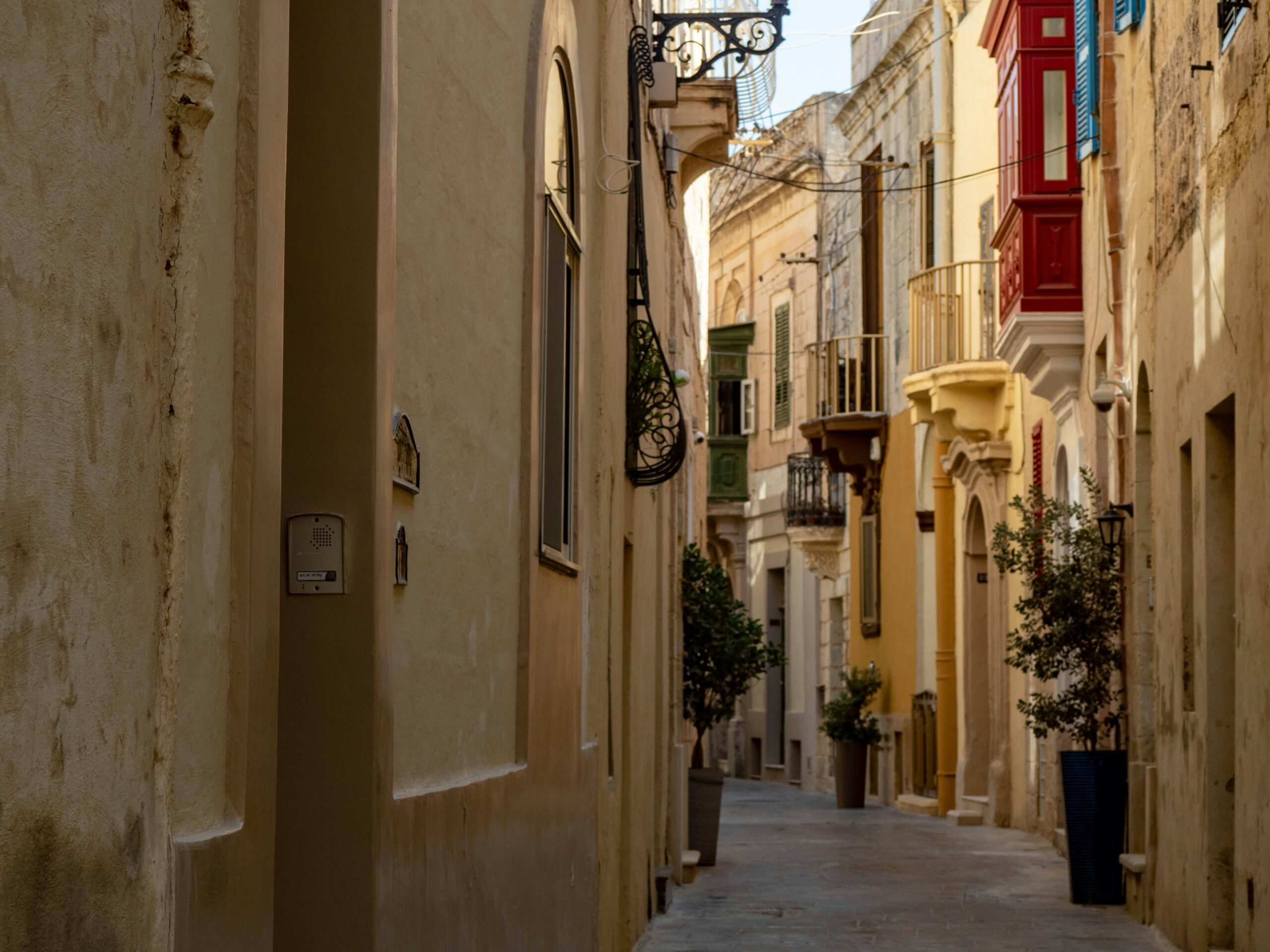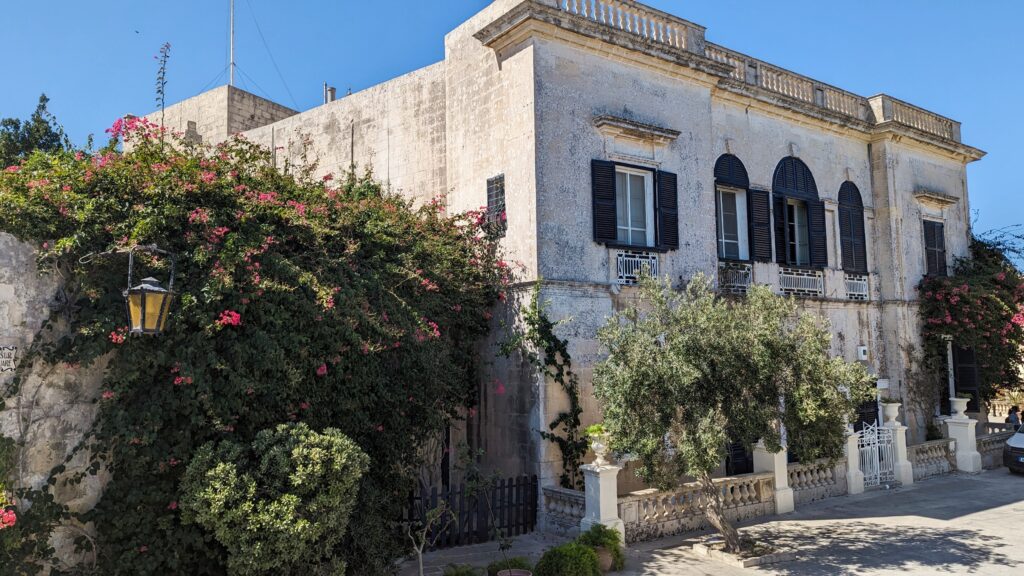


 Mdina and Rabat are neighbouring towns in the heart of Malta , often mistaken for a single destination due to their close proximity and intertwined histories; but they are, in fact, distinct places. Mdina, known as the “Silent City,” is a beautifully preserved medieval walled city perched on a hill, once the capital of Malta and renowned for its noble palaces, baroque architecture, and quiet, narrow streets. Just outside Mdina’s walls lies Rabat, a more lived-in town that grew as a suburb during Roman times. While Mdina feels frozen in time with its elegant grandeur, Rabat offers a more grounded, everyday charm and is home to quaint cafés, important archaeological sites and a sense of local life still in motion. Together, they make for a seamless yet contrasting experience, perfect for a stylish afternoon of exploration.
Mdina and Rabat are neighbouring towns in the heart of Malta , often mistaken for a single destination due to their close proximity and intertwined histories; but they are, in fact, distinct places. Mdina, known as the “Silent City,” is a beautifully preserved medieval walled city perched on a hill, once the capital of Malta and renowned for its noble palaces, baroque architecture, and quiet, narrow streets. Just outside Mdina’s walls lies Rabat, a more lived-in town that grew as a suburb during Roman times. While Mdina feels frozen in time with its elegant grandeur, Rabat offers a more grounded, everyday charm and is home to quaint cafés, important archaeological sites and a sense of local life still in motion. Together, they make for a seamless yet contrasting experience, perfect for a stylish afternoon of exploration. Getting to Mdina and Rabat from Valletta is very straightforward. A direct bus (routes 51, 52, or 53) takes around 45 minutes to get there. If you’re short on time, a private taxi or Bolt service will get you there in 30 minutes.
Alternatively, renting a car offers freedom to explore the countryside beyond Mdina and Rabat, though parking can be a mild headache near the town gates.
I recommend the afternoon over the morning as late afternoon is when these towns truly shine. Between 3 PM and sunset, golden light bathes the sandstone buildings and creates a dreamlike palette for photography. Tourist groups tend to thin out which allows for a more intimate experience. Weekdays are generally quieter than weekends.
Begin in Mdina, starting at the main gate and working your way through key sights. After lunch and shopping, make your way to Rabat on foot, and stop for a coffee, a museum visit and some light shopping therapy before watching the sunset.
Crossing the stone bridge into Mdina feels like stepping into another era. The grand entrance, with its statues and old emblems, gives you a taste of what’s to come. It’s worth slowing down here to take it all in.
Vilhena Palace, a fine example of Baroque architecture, now houses the Natural History Museum. Even if you don’t go inside, stop to admire the building’s detailed balconies and balanced design.
St. Paul’s Cathedral stands out with its golden stone and grand dome. Inside, you’ll find marble floors, detailed altars, and painted ceilings that make it one of the city’s main highlights.
Head to the bastion walls for sweeping views over Malta’s green fields, villages and the sea. It’s a peaceful spot perfect for photos.
Mdina’s narrow alleys are remarkably quiet, your footsteps will be the only sound echoing off the stone walls.
As you wander, take note of the weathered doorways, traditional lanterns and the occasional horse-drawn carriage passing by. It’s easy to get lost here—in the best way.
Make a stop at the Fontanella Tea Rooms by the city wall and try their heavenly chocolate and strawberry or cherry and almond cakes.
For a refined lunch, try De Mondion. Located in a historic building, it serves Maltese food with a modern touch.
I highly recommend the Fork and Cork for their slow-cooked lamb shank with white beans and The Medina for their exquisite location and their menu which offers a fusion of traditional classic mediterranean and middle-eastern cuisines.
Skip the mass-produced souvenirs and look for locally made items like carved trinkets.
Mdina is known for its filigree jewellery, fine, delicate designs in silver or gold. These pieces make thoughtful gifts or keepsakes.
Don’t miss Mdina’s Glass for colourful, hand-blown pieces. You’ll also find shops selling hand-stitched linens, leather bags, and painted ceramics.
Leave Mdina through the back gate and walk down the hill. In just a few minutes, you’ll arrive in Rabat where you’ll find a busier, more everyday side of Maltese life.
Rabat is full of photogenic corners; flower-covered balconies, stone arches, and quiet courtyards. If you enjoy photography, now is the time to get out your camera.
Look out for old door knockers, small religious shrines built into walls and the smell of bread from nearby bakeries. These small details make the walk memorable.

By Diego Delso, CC BY-SA 4.0, https://commons.wikimedia.org/w/index.php?curid=122595329
This church stands impressively above ancient caves where St. Paul is said to have stayed. The mix of history and calm gives the site a special feel.
This ruined Roman-era house was built in 1st century BC as an aristocratic town house. It has beautiful mosaic floors and displays that show daily life from centuries ago and is a unique glimpse into Malta’s older history. The house is open for visits every day and you can a ticket online or at the door.
Step into the Wignacourt Museum for art and history. The museum houses an impressive collection of paintings, silver and other unique artefacts; or stop at one of the small chapels if you are seeking some peace and quiet.
Make a stop at a cozy café like Toffee & Co.They offer a warm welcome and the coffee is good.
For a quick afternoon snack, head to Crystal Palace for the flakiest, most delicious pastizzi.
For early evening drinks, head to Grotto Tavern. Its stone walls and soft lighting make it a great place to try local wine and snacks.
You’ll find many shops that sell local produce like handmade soaps, prints and local honey. They’re great options for gifts or personal keepsakes. If you like art, look for small workshops where artists sell their own creations such as ceramics, textiles or drawings.
While Mdina and Rabat are distinct in character, they complement each other beautifully and make for a delightful afternoon experience.

